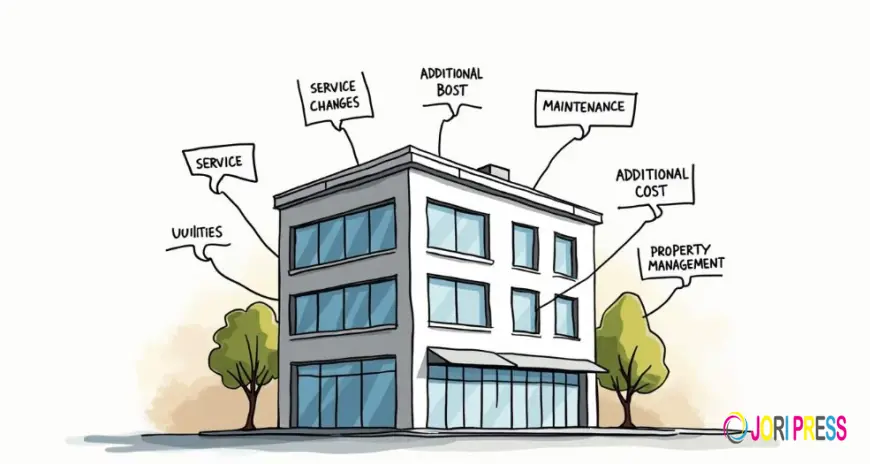Understanding Service Charges and Additional Costs in Commercial Rent

When a business signs a lease for commercial property, the headline rent figure is rarely the whole story. Service charges and other additional costs often catch tenants by surprise, sometimes inflating the monthly outgoings by a significant margin. Knowing what these charges cover, how they’re calculated, and what rights tenants have to challenge or negotiate them can save money and avoid headaches down the line.
What Exactly Are Service Charges?
Service charges are fees landlords levy on tenants to cover the costs of maintaining and managing the property. They’re separate from the base rent and usually cover shared expenses that benefit all tenants in a building or complex. Think of them as the upkeep costs for communal areas and services.
Examples include cleaning of hallways and lobbies, landscaping, security, lighting in common areas, maintenance of lifts and fire safety systems, and sometimes insurance for the building itself. These charges ensure the property remains safe, functional, and presentable.
It’s important to understand that service charges are typically variable. They fluctuate based on actual costs incurred during the year, rather than being a fixed fee. This means tenants might pay less one year and more the next, depending on how much maintenance or repairs were necessary.
Moreover, service charges can also encompass a variety of additional services that enhance the living experience for tenants. For instance, some landlords might include amenities like gym facilities, swimming pools, or concierge services within these charges. These amenities not only provide convenience but also contribute to a sense of community among residents, making the property more desirable. It's worth noting that the inclusion of such services can significantly influence the overall service charge, so tenants should always review the breakdown of these fees carefully.
Transparency is key when it comes to service charges. Landlords are generally required to provide a detailed account of how these charges are calculated and what specific services are covered. This can help tenants understand the value they are receiving for their money and ensure that they are not being overcharged. In some cases, tenants have the right to challenge service charges they believe are unjustified, which can lead to discussions between landlords and tenants about the necessity and fairness of certain fees. This ongoing dialogue can foster a better relationship between both parties, ensuring that the property is well-maintained and that tenants feel their concerns are being heard. For more details or professional assistance regarding property management and service charges, visit Property Store.
How Are Service Charges Calculated?
Service charges are usually apportioned among tenants based on the size of their leased space relative to the total lettable area. For instance, if a tenant occupies 10% of the building’s floor space, they might be responsible for 10% of the service charge costs.
However, the exact method can vary. Sometimes charges are divided by floor, by unit, or by usage, especially if some tenants use more of a service than others. For example, a tenant with a large parking allocation might pay more for parking lot maintenance.
Transparency is key. Tenants should receive a detailed breakdown of how service charges are calculated. Landlords are generally required to provide accounts, invoices, and explanations for each charge. If these aren’t forthcoming, that’s a red flag.
Common Components Included in Service Charges
Here’s a closer look at what might be included:
- Cleaning and Janitorial Services: Regular cleaning of communal spaces, window washing, waste removal.
- Repairs and Maintenance: Fixing roofs, plumbing, electrical systems, HVAC servicing.
- Security: Guards, CCTV monitoring, alarm systems.
- Utilities for Common Areas: Electricity for lighting corridors, water for landscaping.
- Groundskeeping: Lawn care, snow removal, gardening.
- Building Insurance: Often included in the service charge rather than billed separately.
In addition to these components, some service charges may also encompass amenities that enhance the overall tenant experience. For instance, the costs associated with maintaining fitness centers, lounges, or rooftop gardens can be factored into the service charges. These amenities not only provide convenience but also contribute to a sense of community among tenants, making the building a more desirable place to work or live.
Moreover, service charges can fluctuate based on seasonal needs or unexpected repairs. For example, during winter months, snow removal and heating costs may rise, leading to an increase in service charges. Conversely, during the summer, costs related to air conditioning maintenance and landscaping may become more prominent. It's essential for tenants to stay informed about these potential changes and understand how they might impact their overall expenses.
Additional Costs Beyond Service Charges
Service charges don’t cover everything. Tenants should anticipate other costs that might arise during their lease, which can significantly impact the total cost of occupancy.
Business Rates
Business rates are a form of property tax charged by local authorities. They’re based on the property’s “rateable value,” which is an estimate of the open market rental value at a given date. Unlike service charges, business rates are paid directly to the council, not the landlord.
For many businesses, this is a substantial expense. While some leases make tenants responsible for paying business rates, others might have the landlord cover them, so it’s crucial to check the lease terms carefully. Additionally, it’s worth noting that certain businesses may qualify for relief or exemptions based on their size or type, which can alleviate some of the financial burden associated with these rates.
Utilities
Electricity, gas, water, and telecommunications are often billed separately from rent and service charges. In some cases, utilities for communal areas are included in service charges, but individual tenant usage is billed directly. Understanding who pays for what is essential to avoid surprise bills.
Moreover, energy efficiency measures can play a significant role in utility costs. Tenants may want to consider investing in energy-efficient appliances or smart meters to monitor usage. These measures not only help in reducing costs but also contribute to sustainability efforts, which are increasingly important in today’s business landscape.
Insurance
Landlords usually insure the building itself, but tenants may need to arrange their own contents insurance or public liability insurance. Sometimes leases require tenants to reimburse the landlord for building insurance as part of the service charge or as a separate cost.
It’s also advisable for tenants to review their insurance policies regularly to ensure they have adequate coverage for their specific needs. This includes considering additional coverage for business interruption, which can provide financial protection in the event of unforeseen circumstances that disrupt operations.
Repairs and Fit-Out Costs
Depending on the lease, tenants might be responsible for repairs within their unit or for the initial fit-out of the space. Fit-out costs can be significant, especially if the space requires customization for the tenant’s specific needs.
Additionally, tenants should be aware that some leases may stipulate that they must return the property to its original condition at the end of the lease term, which can lead to further costs. Engaging with a professional designer or contractor early in the process can help manage these expenses and ensure that the fit-out meets both functional and aesthetic requirements, ultimately enhancing the business's operational efficiency and appeal to customers.
How to Manage and Negotiate Service Charges
Service charges can feel like a black box, but tenants have rights and strategies to keep these costs fair and transparent.
Review the Lease Carefully
Before signing, scrutinize the lease to understand what service charges cover and how they’re calculated. Look for clauses about caps on increases, dispute resolution processes, and rights to inspect accounts.
Request Detailed Statements
Ask the landlord or managing agent for detailed breakdowns of service charges. These should include invoices, receipts, and explanations for each item. If the landlord resists, this could be a warning sign.
Challenge Unreasonable Charges
If charges seem excessive or unrelated to the property’s maintenance, tenants can challenge them. Many jurisdictions have tribunals or regulatory bodies that handle disputes over service charges. It’s worth seeking professional advice if a landlord is uncooperative.
Negotiate Caps or Fixed Charges
Where possible, negotiate for a cap on service charge increases or a fixed charge for a set period. This provides budgeting certainty and protects against unexpected spikes.
Participate in Management Decisions
Some leases allow tenants to have a say in the management of the property or to appoint a representative to liaise with the landlord. Being involved can help ensure that service charges are reasonable and services are delivered efficiently.
Common Pitfalls and How to Avoid Them
Many tenants get caught out by hidden or poorly explained charges. Here are some common pitfalls:
Failing to Budget for Variable Costs
Assuming rent is the only cost can lead to cash flow problems. Always factor in service charges, business rates, and utilities when budgeting.
Not Understanding Lease Terms
Leases can be complex. Missing clauses about service charges or additional costs can lead to unexpected liabilities. Professional legal advice before signing is invaluable.
Ignoring Service Charge Accounts
Some tenants pay service charges without question. Reviewing accounts annually can uncover errors or overcharges.
Overlooking Repair Responsibilities
Tenants may be responsible for repairs inside their unit. Clarify these obligations upfront to avoid surprise bills.
Final Thoughts
Service charges and additional costs are a significant part of commercial rent. They’re not just extras-they’re ongoing expenses that affect a business’s bottom line. Understanding what these charges cover, how they’re calculated, and how to manage them is essential for any tenant.
Approach lease negotiations with these costs in mind. Ask questions, request transparency, and don’t hesitate to seek expert advice. A well-informed tenant is better equipped to avoid costly surprises and maintain a healthy, predictable budget.
What's Your Reaction?
 Like
0
Like
0
 Dislike
0
Dislike
0
 Love
0
Love
0
 Funny
0
Funny
0
 Angry
0
Angry
0
 Sad
0
Sad
0
 Wow
0
Wow
0











































